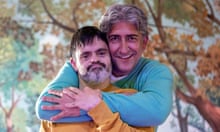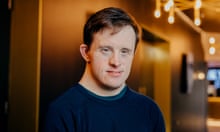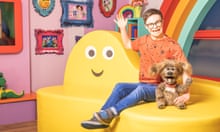Award-winning film producer Ken Ross is calling for more people with disabilities to be seen on TV and film screens all around the world. “If we never give individuals these roles, we’ll never move forward. We don’t need to change people to be the part we want them to be, and we don’t need to be worried about casting someone with a disability,” he says. “You would never ask someone to ‘black up’ to play Nelson Mandela – so why would you ask an actor to ‘impersonate’ someone with a disability?”
Ross has spent the past two decades working with the UK government, the NHS, Bafta and various other institutions to promote greater diversity and inclusion of people with disabilities. And although much has changed for the better (the Baftas and Oscars both recently revamped their diversity requirements, and actors such as Tommy Jessop, who has Down syndrome, are increasingly gaining industry-wide recognition), there is still serious work to be done. Ross says: “We need to get sales agents feeling more comfortable screening films that have people with disabilities. And we’ve got to see people writing their own stories, too.”
Today, despite Covid-19 preventing many TV and film projects from getting off the ground, Ross, who is also a real estate investor, has been screening calls from producers and directors keen to cast more actors with disabilities, among them George Clooney, who is talking to Ross about improving opportunities for people with Down syndrome across the industry. Ross’s last two projects, Innocence and My Feral Heart, both of which star actors with the condition, won various international awards, with Innocence in the running for an Oscar this year.
“Producers call me up and say, ‘Look, I’ve had a part written for this actor after I saw him in your film and was blown away,’” explains Ross. Creating jobs for people with Down syndrome in the film industry is great for both spreading awareness of the condition and showing that it can be seen in a positive light, he adds. “When statistics show that only 6% of people with a learning disability are in paid work, it makes sense to create jobs in the film industry, where you can reach an audience of millions and encourage people to think a little bit more about how they can include others.”
Ross had an “epiphany” about disability in 2004, he says, when his wife Rachael gave birth to their third son, Max, who has Down syndrome. At the time, the condition was still considered so taboo that even the hospital staff were pointed in how they discussed it.
“I hadn’t fully grasped until Max’s birth how excluded people with Down syndrome, or other disabilities, really were,” explains Ross.
“Instead of celebrating our new child, the doctor sought to highlight lots of fears and worries that could be associated with any birth. So much knowledge of Down syndrome in the health service has been got through outdated anecdotes, false stereotypes and unwelcome assumptions on how lives are ‘valued’.”
Ross is trustee and vice-chair at Portsmouth Down Syndrome Association, a charity Rachael co-founded in 2010 in order to fill the void of specialist support for families with children with the condition. While some organisations in the UK use the term Down’s syndrome to refer to the condition, Ross feels very strongly that no apostrophe is necessary and has requested the Guardian not to use it.
“I, like many others, don’t like ‘Down’s syndrome’, because it erroneously implies that the physician who first identified the condition, John Langdon Down, also had it. I also believe it can encourage the use of offensive terminology like ‘a Down’s person’. Globally, the term ‘trisomy 21’ is now increasingly used in place of Down syndrome, which I personally feel is more appropriate, and we may see a greater shift towards this name in the future.”
Over the past decade, the charity has provided hundreds of children with tailored learning in more than 100 mainstream schools in Hampshire and further afield, while also training NHS professionals and teachers on diversity and inclusion.
“The goal is for society to understand that individuals with a learning disability can lead semi-independent lives, make essential contributions and be valued members of their communities – as well as have the same hopes, dreams and aspirations as everyone else,” explains Ross.
Much of the prejudice towards people with Down syndrome can be traced back to the “segregation” of just a few decades ago, he says. In 1945 in the UK, the life expectancy for a child born with Down syndrome was just 12 years, while up until the 1970s it was still commonplace for babies with the condition to be taken straight from the hospital to an institution. Today, roughly 40,000 people in the UK have Down syndrome and life expectancy is beyond 60, due to medical advances, as well as the fact that most children with the condition today live at home and can go on to lead full lives.
But much more needs to be done in terms of policy, says Ross. “Down syndrome is the least funded, yet most prevalent chromosomal learning disability in the UK, and there is no [national] policy at all regarding the education or employment of people with Down syndrome.”
Covid-19, and its disproportionate effect on people with learning disabilities, has only underlined how biased the system is, adds Ross: “The Covid-19 death rate for people with learning disabilities is six times the rate of the general population, and the [unlawful] “do not resuscitate” orders that have been issued to people with learning disabilities are extremely worrying. This all just goes to highlight the institutional bias that exists within the health service towards people with learning disabilities, whether directly or indirectly.”
Ross points to the current prenatal NHS screening offered to all expectant mothers, which assesses a woman’s chance of having a baby with Down syndrome, as further evidence of that bias. An estimated 90% of women whose unborn babies are diagnosed with the condition go on to have an abortion, which is legal right up until birth.
“Why do you need to know if your baby is going to have Down syndrome or not?” asks Ross, who is lobbying parliament to remove the NHS screening on grounds that it is prejudicial. “A life is a life, and the only difference with Down syndrome is that you have one extra chromosome and a learning disability. . Yet this screening programme makes people feel like they’re not meant to be here.”
The screening test took centre stage in a recent Emmerdale storyline, in which a couple chose to selectively abort their unborn child after learning that the baby had Down syndrome. It attracted hundreds of Ofcom complaints before it even aired and more than 31,000 people have since signed a petition calling on ITV to cancel the storyline.
“I have no doubt that if they had attempted this storyline with any other minority, they would have been closed down early,” says Ross.
“What I want to see on the screen is someone with Down syndrome as recognisable as Brad Pitt, just to open the doors for everyone else. If one person can do it, everyone else can follow. It’s not impossible.”
Curriculum vitae
Age: 49.
Lives: Hampshire.
Family: Married with three sons.
Education: British School of Paris; Southampton University (History and French); Southampton Institute (Chartered Institute of Management Accountants).
Career: 2011-present: principal, RBH Group; 2019: producer, Innocence; 2018: executive producer, Scarborough; 2016: executive producer, My Feral Heart; 2012: executive producer, Gallowwalkers; 1998-2009: principal, various real estate companies; 2005: investor, Wallace & Gromit: The Curse of the Were Rabbit; 2005: investor, Oliver Twist; 1994-1998: estate agent, Black Horse Agencies.
Public life: 2009-present: strategist, trustee and vice chair, Portsmouth Down Syndrome Association; 2018-present: co-founder, National Policy Group for Down Syndrome; 2018-present: co-originator, Bafta diversity and inclusion panel; 2004-2009: fundraiser and promoter, Down Syndrome Education International.
Interests: Family, inclusion, rugby, travel, film and TV, history.









